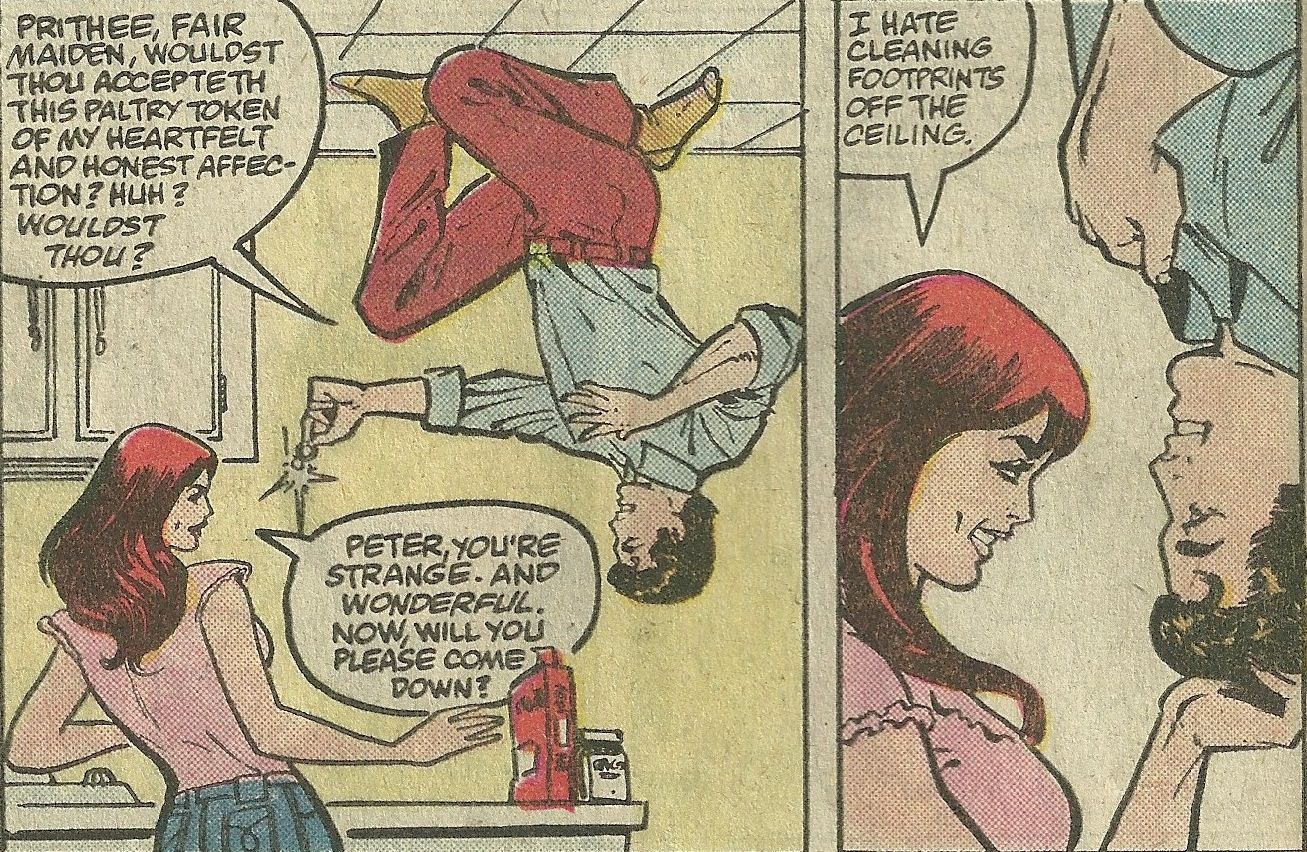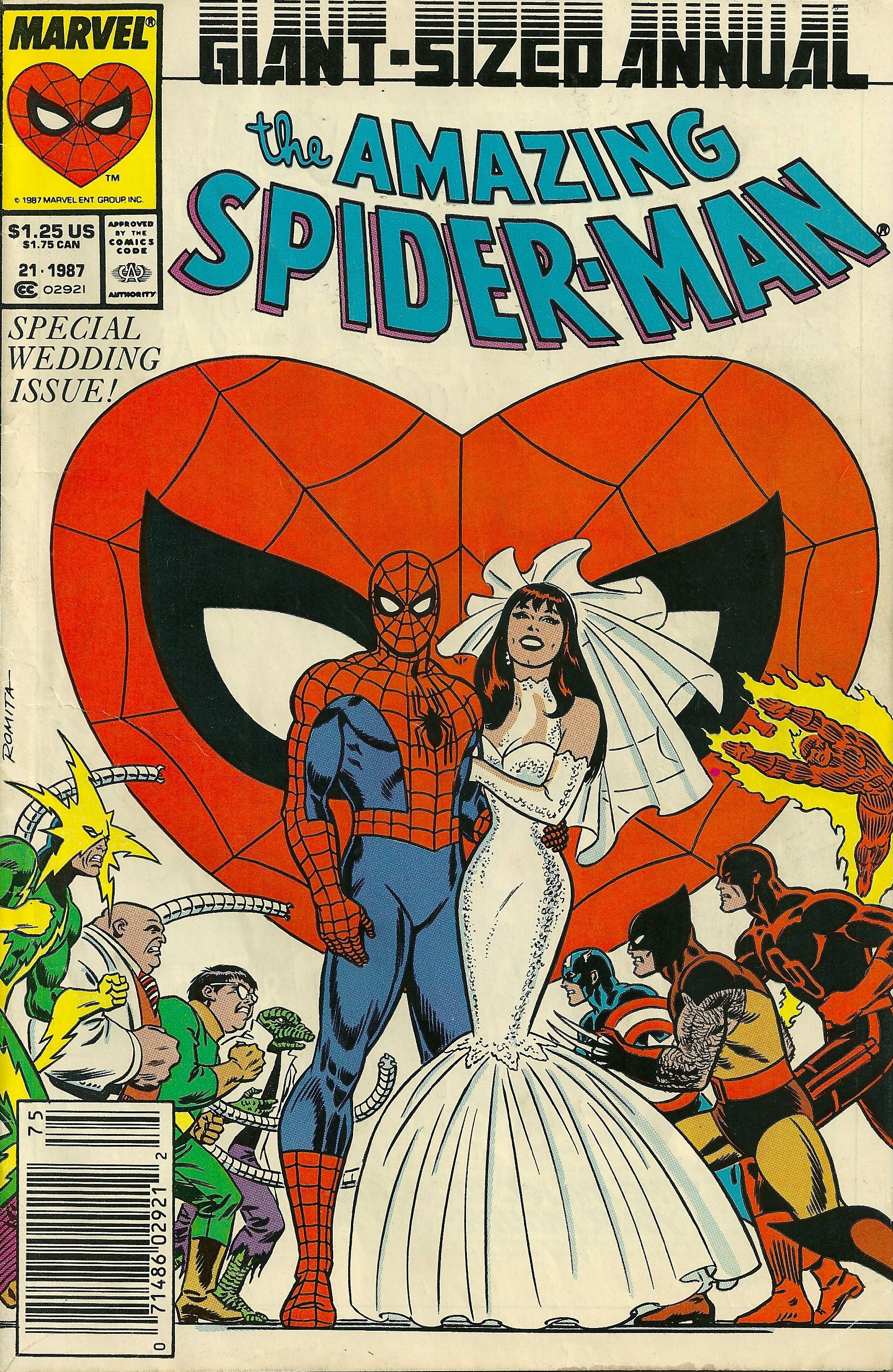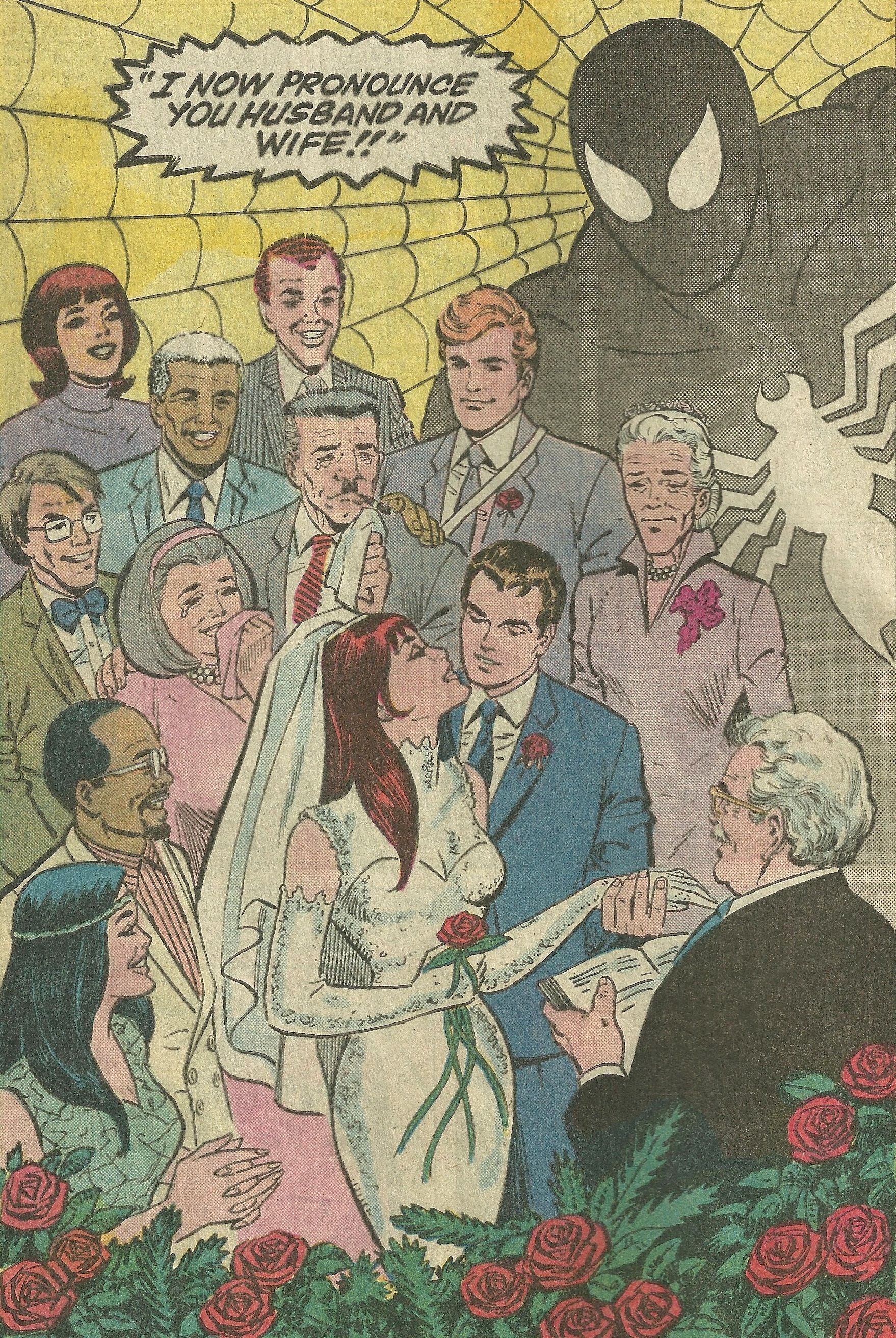A column in which Matt Derman (Comics Matter) reads & reviews comics from 1987, because that’s the year he was born.
The Amazing Spider-Man Annual #21 (Marvel) by David Michelinie, Paul Ryan, Vince Colletta, Bob Sharen, Rick Parker, Jim Salicrup, and Jim Shooter
Mary Jane Watson and Peter Parker's marriage is a weirdly divisive subject for some people, but I don't personally have too strong an opinion on whether or not Spider-Man ought to be married. When it happened in 1987, it was pretty much a gimmick, an editorially mandated special event designed to sell comics based on the novelty, as opposed to being a story that someone felt needed to be told. As such, there's only the faintest impression of a plot in this comicbook, despite its extra pages and the fact that then editor-in-chief Jim Shooter is credited with the plot and David Michelinie with the actual script. It's hard to imagine Shooter's role amounting to very much more than telling Michelinie, "Spider-Man gets married, even though he and Mary Jane both have doubts." I'd believe he contributed less than that, because that's about 90% of what the issue contains, and I want to give Michelinie and the artists some credit.
There is a fight with Electro to kick things off, but it's an obligatory action scene to get the superheroics out of the way up top so all the second-guessing and dragging of feet can begin. Most of the story revolves around MJ and Peter questioning if they're really ready to get married. She wonders if domesticity will be too limiting, slow-moving, and repetitious when compared to the glamorous parties and limos and other trappings of her current life as a supermodel. He worries about the same thing, to a degree, that he won't be able to give her what she's used to/what she really wants. He also mentally revisits old relationships like Betty Brant and Gwen Stacy, noting that in both cases the lives of those women were ruined (and in one case ended) because of his being Spider-Man. Naturally enough, Peter is afraid that the world of Spider-Man will similarly harm Mary Jane someday, which makes him question how fair or right it is to marry her.
In between these scenes of self-reflection and self-doubt, we see the rest of the world reacting positively to the idea of the young couple getting hitched. Aunt May and Aunt Anna, Flash Thompson and Harry Osborn, even J. Jonah Jameson are all on board, full of congratulations, advice, and what seems to be earnest belief in MJ and Peter's love. Perhaps this is meant as a contrast to the pair's own trepidations, but neither Peter nor Mary Jane are given much time to react to anything the rest of the cast says, always too busy sorting through their own fears. This makes it too easy for the reader to also ignore the supporting players, since nothing they bring to the table matters or even affects what comes next.
Then again, none of Mary Jane and Peter's fretting makes a difference when the comic concludes, either. Though they both arrive late (for no clear reason) they do show up for the wedding and the ceremony goes off seamlessly. Instead of making the actual wedding a moment of conflict or action, there is a dream sequence that precedes it where Peter imagines that all the guests are either superheroes or supervillains, and the two sides inevitably come to blows. It's a final bit of violence tossed in for good measure, and an opportunity to dress Peter in the classic red-and-blue costume, rather than the black-and-white one he was sporting at the time. Then the wedding itself is simple and straightforward, taking up only four of the issue's 43 pages, including a full-page splash of the official pronouncement. That page—with its giant figure of Spider-Man and a huge web
taking up the background, the whole supporting cast awkwardly crowding around the newlyweds, and a dialogue balloon that makes it look like the officiant is screaming at the top of his lungs—is meant to be the big climax, the moment we've all been waiting for. But since nothing that precedes it meshes at all with the love and happiness on display, it instead comes across as a wedged-in conclusion, there because it has to be, not as the natural result of the rest of the narrative.
The jerky shifts in tone aren't the only problems with Michelinie's script. There's a general clunkiness to the writing, a stiffness that mutes everything. The dialogue has no nuance and very little personality, everyone sounding something between two-dimensional and downright robotic. If anything was going on other than long-winded conversations and internal monologues about people's feelings, maybe this lack of energy in the writing wouldn't be quite so irritating. The opening Electro fight isn't all bad, for example. But as it stands, Michelinie's work pulls down an already slow and uninteresting tale.
My biggest gripe, though, is that Michelinie fails completely to convince me that these two belong together. On the contrary, based on this issue I would have bet on them divorcing within five years, each of them eventually forced to realize they never wanted to get married in the first place. It's not clear to me when either of them finally do get over themselves and decide that, yes, they should go through with it. The last time we see Mary Jane before the wedding, she's at a party with friends who're all trying to talk her out of it, and she doesn't seem too bothered by what they say, even openly agreeing with some of their arguments. Peter's last single moment is the aforementioned nightmare where the Spider-Man part of his life ruins his wedding, a very literal interpretation of what we already know is his biggest fear. How either of them go from that to total comfort with marriage isn't shown; it happens off-panel if at all. They also spend a good deal of this story avoiding and even lying to one another. Mary Jane hangs out a lot with Bruce, a mysterious man hell-bent on stealing her away from her fiancé. Peter pretends not to be still hung up on or tortured by Gwen Stacy's death, and even once comes close to telling Mary Jane he thinks the wedding is a bad idea before swallowing that as well. For a couple to be so unwilling or unable to honestly communicate with one another, especially on the topic of their own relationship, is troubling at best.
I feel for Paul Ryan and Vince Colletta, tasked with filling this double-sized issue with an awful lot of people standing or sitting around. I suppose, this being Marvel, that Ryan may have actually done some or most of the plotting himself, but even if that's the case, I can understand why it'd be challenging to do 43 pages about a wedding in a superhero comic and keep it interesting, especially if bad guys aren't going to show up and smash things. It would've been nice, though, if the ceremony had some fanfare around it, or even just if it were given more space. Where are the flowers, where's the cake, why no dancing? Mary Jane's bachelorette party is a hundred times more festive and better attended than her wedding. Even in Peter's nightmare, the venue looks nicer and the crowd larger than they do in real life.
Ryan and Colletta do nicely capture Peter's general sullenness and MJ's mixed bag of forced happiness and inner turmoil. At least they look convincing, even if they sound a little stilted. And the art does a much better job of showing genuine affection between them than the script does. When they're together, Michelinie keeps their conversations largely superficial, but if you looks at the
images and ignore the words, those scenes do show a couple that's really in love. They smile, they touch one another playfully and frequently, and they actually look at each other as if they want to connect. The words show us just how little connection is truly taking place, but the visuals at least indicate that there's a shared desire to make it happen.
Mostly, though, the art is just as boring as the narrative, if for no other reason than that nothing exciting occurs. Even battling Electro is a quick, easy win for Spider-Man, with relatively low stakes and an unimpressive performance from the villain. This is a comic consisting primarily of near-pointless chatter, and that leaves little for the art to do.
The Amazing Spider-Man Annual #21 doesn't seem very into its own concept. The central characters poke holes in it all the way through, and then when the main event happens, it's halfhearted and over too quickly. Meanwhile, everything is so mundane and inconsequential, just wheel spinning until the finish line arrives and the shortsighted goal of this whole effort can finally be reached. Wherever you stand on the idea of a married Spider-Man, or the elaborate retcon that ultimately undid the entire contents of this comic, it's hard to defend the story of the wedding itself.



